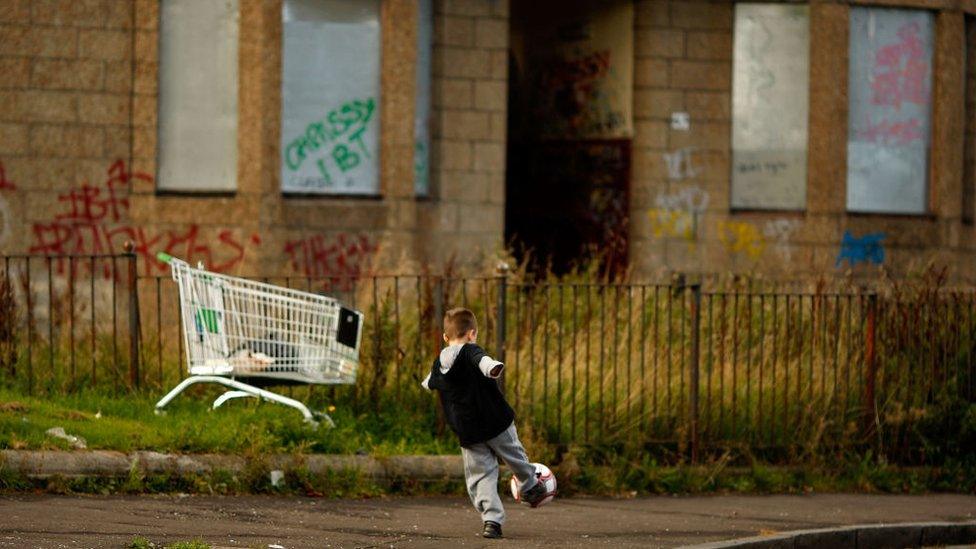Holyrood 2021: SNP's Sturgeon pledges to double child payment
- Published
Holyrood 2021: "Time to end the scandal of child poverty"
The Scottish Child Payment will double if the SNP is re-elected in May's election, Nicola Sturgeon has pledged.
The government is currently rolling out a £10 per week payment for children aged under six in low income families.
The Scottish first minister told the SNP's campaign conference that this would eventually extend to under-16s, reaching 170,000 children.
Labour, the Greens and Lib Dems all back similar policies, with early years care a focus in election campaigning.
The new child benefit was set up as part of the new Social Security Scotland agency in the previous Holyrood term, with more welfare powers being devolved to Scotland.
Ms Sturgeon said it would take until the end of 2022 to get the system fully up and running and delivering monthly payments.
However, she said a "bridging" system would be set up in the interim to pay £520 to qualifying families this year and next year, something the SNP leader said would "help lift more children out of poverty".
And she said that over the course of the five-year Holyrood term, an SNP government would double the payment for every eligible child to £20 per week.

Ms Sturgeon said ending child poverty should be the "driving mission" of the next parliament
She said: "I want to make ending child poverty a driving mission for the next parliament.
"It is time to end the scandal of child poverty, and this will help us do it. And it is a down payment of what will be possible when we have the full powers over tax and social security that only independence can deliver."
Ms Sturgeon also repeated her pledge of a "young person's guarantee", which will give everyone aged 16 to 24 the chance to go to university of college, get a place on a training or work experience programme, or find work or volunteering opportunities.


Nicola Sturgeon's speech outlined the two key pillars supporting the SNP's election campaign: pandemic leadership, and independence.
The first minister stressed her experience in leading Scotland through the Covid-19 crisis, and said she now had little time for political games or self-interest - possibly a veiled dig at her predecessor Alex Salmond and his new party.
On her goal of holding "indyref2" in the first half of the next term, the SNP leader's approach is to explicitly link recovery from the pandemic to independence.
Her unionist opponents seek to juxtapose the two, saying a referendum would endanger the rebuilding effort. Ms Sturgeon's position is the exact opposite - that independence is necessary for Scotland to bounce back from coronavirus in the right way.
One other interesting aspect of the speech was who Ms Sturgeon chose to attack. Time and time again, she went after Boris Johnson - often using the prime minister's own words against him.
Conversely, there was literally no mention of Labour. The party which was once the dominant force north of the border didn't even merit an afterthought.
This underlines just how markedly Scotland's political landscape has changed since the build up to the last Holyrood election in 2016 - and also how Ms Sturgeon would prefer to frame the election as a binary choice between her leadership, and that of Mr Johnson's Conservatives.

And Ms Sturgeon said her government would look to hold an independence referendum once the Covid-19 pandemic has passed.
She said: "I believe Scotland's recovery should be in Scotland's hands - independence is not a distraction from recovery, it is essential to ensure a recovery that is made here in Scotland and based on the values the majority of us subscribe to."
Several other parties had also been calling for the child benefit to be increased.
Anas Sarwar welcomed the move, saying it was a "key policy" which his Scottish Labour Party had been calling for - but said the SNP should have moved sooner.
He added: "The first minister has been in post for seven years. It shouldn't have taken an election campaign for them to make the right choice for Scotland's most vulnerable children."

SCOTLAND'S ELECTION: THE BASICS
What elections are happening? On 6 May, people across Scotland will vote to elect 129 Members of the Scottish Parliament (MSPs). The party that wins the most seats will form the Scottish government. Find out more here.
What powers does the Scottish Parliament have? MSPs pass laws on most aspects of day-to-day life in Scotland, such as health, education and transport. They also have control over some taxes and welfare benefits. Defence, foreign policy and immigration are decided by the UK Parliament.
How do I vote? Anyone who lives in Scotland and is registered to vote is eligible, so long as they are aged 16 or over on the day of the election. You can register to vote online, external.

The Scottish Greens had also proposed doubling the payment, with co-leader Patrick Harvie saying that "fairness is a crucial part of a green recovery".
He said: "This would be just the first step of creating a new Scotland that protects human rights and doesn't allow anyone to fall into dire straits."
The Lib Dems have committed to the same increase in the payments, with social security spokeswoman Rosemary Bruce saying the party "recognise that poverty and hunger can be major factors in preventing children from achieving their potential".
The Scottish Conservatives meanwhile have warned that Ms Sturgeon's aim of holding an independence referendum could damage the recovery from the pandemic.
Leader Douglas Ross said Scots needed a "parliament 100% focussed on rebuilding Scotland, instead of one hell-bent on pursuing independence".

POLICIES: Who should I vote for?
PODLITICAL: Updates from the campaign
